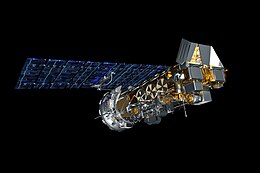NOAA-18

Computer-generated image of NOAA-18 in orbit
|
|
| Mission type | Weather satellite |
|---|---|
| Operator | NOAA |
| COSPAR ID | 2005-018A |
| SATCAT no. | 28654 |
| Mission duration | 2 years |
| Spacecraft properties | |
| Spacecraft type | TIROS-N |
| Manufacturer | Lockheed Martin |
| Launch mass | 1,457 kilograms (3,212 lb) |
| Power | 830 watts |
| Start of mission | |
| Launch date | 20 May 2005, 10:22:01 UTC |
| Rocket | Delta II 7320-10C |
| Launch site | Vandenberg SLC-2W |
| Orbital parameters | |
| Reference system | Geocentric |
| Regime | Sun-synchronous |
| Semi-major axis | 7,230.05 kilometers (4,492.54 mi) |
| Eccentricity | 0.0014261 |
| Perigee | 848 kilometers (527 mi) |
| Apogee | 869 kilometers (540 mi) |
| Inclination | 99.17 degrees |
| Period | 101.97 minutes |
| Epoch | 24 January 2015, 12:53:56 UTC |
NOAA-18, known before launch as NOAA-N, is a weather forecasting satellite run by NOAA. NOAA-N (18) was launched on May 20, 2005, into a sun-synchronous orbit at an altitude of 854 km above the Earth, with an orbital period of 102 minutes. It hosts the AMSU-A, MHS, AVHRR, Space Environment Monitor SEM/2 instrument and High Resolution Infrared Radiation Sounder (HIRS) instruments, as well as the SBUV/2 ozone-monitoring instrument. It is the first NOAA POES satellite to use MHS in place of AMSU-B.
APT transmission frequency is 137.9125 MHz (NOAA-18 changed frequencies with NOAA-19 on June 23, 2009).
...
Wikipedia
